Stock Branch Grafting
By Dr. Muhammed Hasan
Karachi, PAKISTAN

Dr.Hasan with son Muzzammil
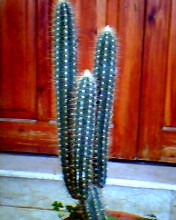
Photo 1. Arrojadoa penicillata prepared for stock branch grafting
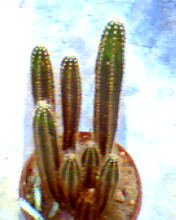
Photo 2. Arrojadoa penicillata
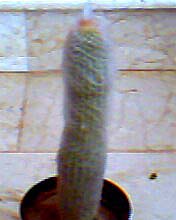
Photo 3. Austrocephalocereus
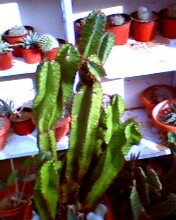
Photo 4. Cereus forbesii
| | | | |
Grafting of cacti is a procedure, which is beneficial for certain reasons.
The first and foremost is, rapid propagation and proliferation. The cacti which grow their roots with difficulty, like crested, variegated and water sensitive cacti are also grafted frequently. Sometimes emergency grafting, seedling jump start, aesthetic beauty, and of course commercial propagation are justifications for grafting.
The most exciting aspect of grafting is, different innovations can be done by trial and error. I have tried a method of "Stock Branch Grafting" in which mother stock as well as off shoots can be grafted with different or same kind of scion. The procedure is lengthy, as we will have to prepare a stock with symmetrical and equally strong branches, in a proper symmetrical manner.
HOW TO PREPARE A BRANCHED STOCK
The characteristic of a stock for this purpose is, that it should give moderate branches and not big clusters and heavy offshoots, which can cause weakening of the main stock. After repeated experiments and observations, I came to the conclusion, that following columnar cacti can be used as stock for branch grafting (see images 1 to 33).
- Arrojadoa penicillata
- Austrocephalocereus
- Harrisia grandiflora
- Cereus forbesii
- Cereus huntigtonianus
- Cereus jamacaru
- Cereus peruvianus
- Cleistocactus winteri
- Cleistocactus strausii
- Echinocereus subinermis
- Echinocereus spinigemmatus
- Escontria chiotilla
- Stenocereus thurberi
- Stenocereus griseus
- Hildewintera aureispina
- Machaerocereus eruca
- Marginatocereus
- Vatricania guentheri
- Myrtillocactus schenckii
- Trichocereus tephracanthus
- Neobuxbaumia euphorbioides
- Pachycereus marginatus
- Pilosocereus azureus
- Rathbunia alamosensis
To prepare a stock for branch grafting, take a strong, juicy, deep green stock. Cut it from the lower end and apply rooting solution. Keep it for some time to dry and then plant it in a pot with proper pot mix.
Wait for rooting, when the roots start emerging, the upper end shows signs of growth. Cut the upper-most part of the stock, to stop upwards growth. Let the wound dry.
Now a few inches from the top, select spines / areoles, where you planned to get the off shoots. Apply Benzyle Aminopurine Gel on the selected areoles. Care should be taken as excess of gel can destroy the whole stock. The gel will stimulate the areoles and off shoots starts growing from them. For healthy and symmetrical branches balanced humidity and sun light is required.
Once the stock with branches is ready, normal grafting methods are applied. grafting on all the branches should be done at a time, so that the growth rate of scions remain same
To get extraordinary results, I would suggest, that each branch stock is grafted with a different kind and colour of scion. Selection of scion should be done in a way, that their growth rate be considered. if all scions grow in equal size, it will beautify the graft.
As a last word I would say, that STOCK BRANCH GRAFTING, requires a "Green thumb and Artistic fingers".
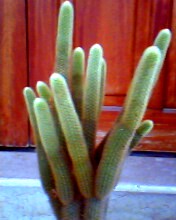
Photo 17. Hildewintera aureispina
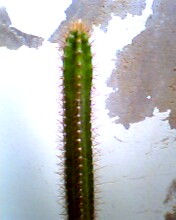
Photo 18. Machaerocereus gummosus
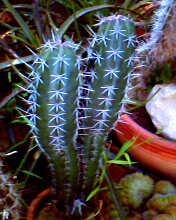
Photo 19. Machaerocereus eruca
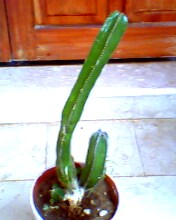
Photo 20. Marginatocereus
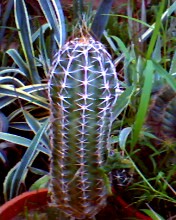
Photo 21. Myrtillocactus schenckii
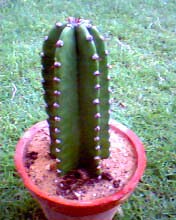
Photo 22. Neobuxbaumia euphorbioides
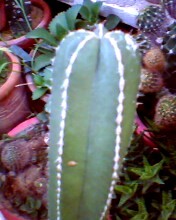
Photo 23. Pachycereus marginatus
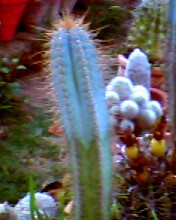
Photo 24. Pilosocereus azureus
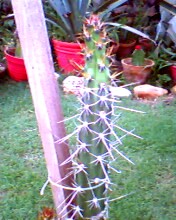
Photo 25. Rathbunia alamosensis
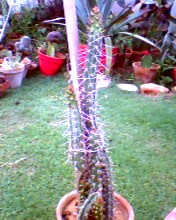
Photo 26. Rathbunia alamosensis
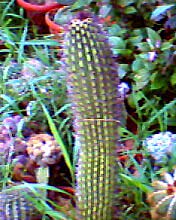
Photo 27. Stenocereus thurberi
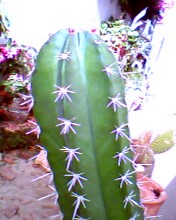
Photo 28. Stenocereus griseus
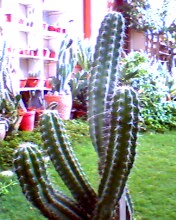
Photo 29. Trichocereus tephracanthus
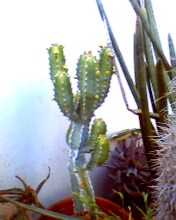
Photo 30. Unknown stock
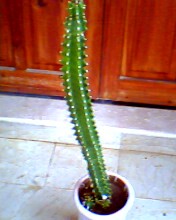
Photo 31. Unknown stock
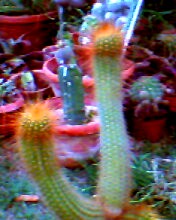
Photo 32. Unknown stock
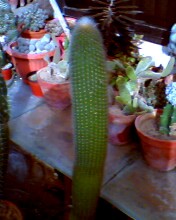
Photo 33. Vatricania guentheri
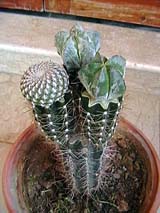
Photo 34. Astrophytum and Rebutia on Arrojadoa branched stock
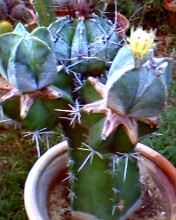
Photo 35. Branched stock Harrisia grandiflora scion different varieties of Astrophytum
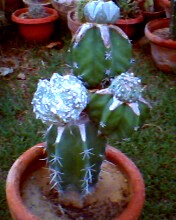
Photo 36. Branched stock Harrisia grandiflora scion different Astrophytums
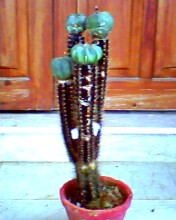
Photo 37. Branched stock Arrojadoa penicillata scions differently ribbed Astrophytums
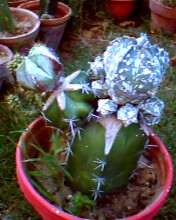
Photo 38. Branched stock Harrisia grandiflora scion Astrophytums
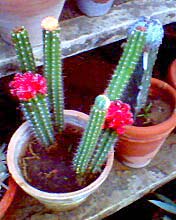
Photo 39. Branched stock Cereus huntingtonianus scions differently coloured Gymno
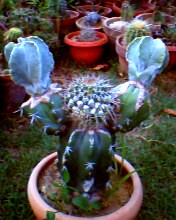
Photo 40. Branched stock Harrisia grandiflora scions Astrophytums & Mammillaria
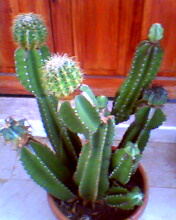
Photo 41. Branched stock Neocardenasia scions Astrophytum, Mammillaria, Echinocactus grusonii, alba.
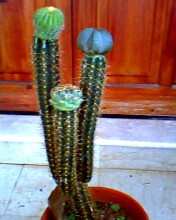
Photo 42. Noto, Coryphantha, and Astrophytum on Arrojadoa branched stock
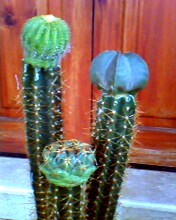
Photo 43. Same close-up
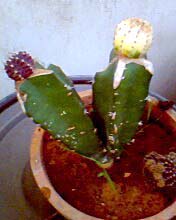
Photo 44. Stock Hylocereus scion Gymnos
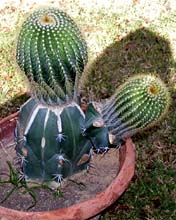
Photo 45. Stock Harrisia grandiflora scion Notocactus claviceps

Photo 46. Neocardensia
| | | | | | | | | | | | | | | | | | | | | | | | | | | | | |





